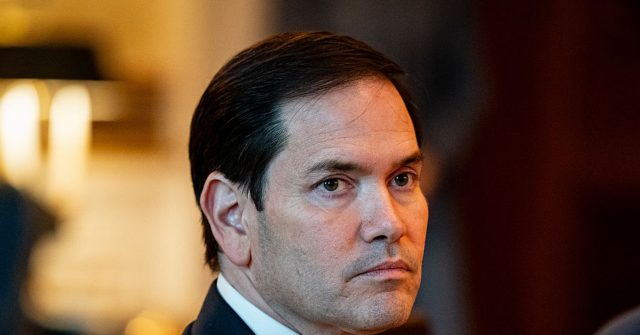The State Department announced a new round of sanctions against employees of the International Criminal Court (ICC) on Wednesday in response to that institution’s accusations of human rights abuses and international crime against Israel and the United States.
In a statement, Secretary of State Marco Rubio declared the ICC, to which neither Israel nor the United States belong, a “national security threat” for attempting to prosecute outside of its jurisdiction. The ICC is a world court established by the Rome Statute, with authority over Rome Statute signatories (neither America nor Israel has signed onto the document). The court has the power to prosecute individuals, not states, on allegations of genocide, war crimes, and crimes against humanity only. The ICC has no enforcement mechanism and thus relies on participating countries to act on its arrest warrants, verdicts, and sentences.
President Donald Trump took action against the ICC as one of the first acts of his second term in office, signing an executive order sanctioning ICC officials targeting Israel and America for prosecution. The ICC’s investigation against Israel centers around that nation’s self-defense actions following the genocidal October 7, 2023, massacres by the jihadist terrorist organization Hamas. The ICC is also investigating the U.S. military for alleged transgressions during the 20-year Afghan War.
“The United States has been clear and steadfast in our opposition to the ICC’s politicization, abuse of power, disregard for our national sovereignty, and illegitimate judicial overreach,” Rubio said on Wednesday. “The Court is a national security threat that has been an instrument for lawfare against the United States and our close ally Israel.”
Rubio expanded the Trump executive order from February to apply to four ICC officials — Kimberly Prost of Canada, Nicolas Guillou of France, Nazhat Shameem Khan of Fiji, and Mame Mandiaye Niang of Senegal.
“These individuals are foreign persons who directly engaged in efforts by the International Criminal Court (ICC) to investigate, arrest, detain, or prosecute nationals of the United States or Israel, without the consent of either nation,” Rubio explained.
The sanctions block the individuals’ assets in the United States and prevent them from doing any business in America or with American citizens. Rubio’s announcement of the sanctions encouraged nations friendly to the ICC, “many of whose freedom was purchased at the price of great American sacrifices, to resist the claims of this bankrupt institution.”
The State Department explained the specific reasons for targeting the individuals in question in a separate fact sheet:
Prost is being designated for ruling to authorize the ICC’s investigation into U.S. personnel in Afghanistan. Guillou is being designated for ruling to authorize the ICC’s issuance of arrest warrants for Israeli Prime Minister Benjamin Netanyahu and former Minister of Defense Yoav Gallant. Deputy Prosecutors Shameem Khan and Niang are being designated for continuing to support illegitimate ICC actions against Israel, including upholding the ICC’s arrest warrants targeting Prime Minister Netanyahu and former Defense Minister Gallant since they assumed leadership for the ICC’s Office of the Prosecutor.
The ICC responded to the sanctions with an incendiary statement defending its judges and prosecutors, stating that as an institution it “deplores” the American decision.
“These sanctions are a flagrant attack against the independence of an impartial judicial institution which operates under the mandate from 125 States Parties from all regions,” the ICC countered. “They constitute also an affront against the Court’s States Parties, the rules-based international order and, above all, millions of innocent victims across the world.”
The court concluded demanding that its member states “and all those who share the values of humanity and the rule of law” to support it.
The latest round of sanctions expands the number of ICC officials affected, building on the initial executive order from February. In that order, Trump condemned the ICC for having “engaged in illegitimate and baseless actions targeting America” and emphasized the lack of official power the court has over the United States.
“The ICC’s recent actions against Israel and the United States set a dangerous precedent, directly endangering current and former United States personnel,” Trump wrote, “including active service members of the Armed Forces, by exposing them to harassment, abuse, and possible arrest.”
Trump’s executive action restored sanctions that he had already imposed during his first term in office, but former President Joe Biden had lifted.
In June, Rubio applied the executive order to sanction Solomy Balungi Bossa of Uganda, Luz del Carmen Ibáñez Carranza of Peru, Reine Adelaide Sophie Alapini Gansou of Benin, and Beti Hohler of Slovenia, all ICC officials involved in the same investigations.
The ICC announced in November that it would issue arrest warrants for Israeli Prime Minister Benjamin Netanyahu and former Defense Minister Yoav Gallant in response to Israel’s efforts to eradicate the jihadist terrorist organization Hamas from Gaza. The warrants were a response to a demand from prosecutor Karim Khan, who also called for warrants for several Hamas leaders, including Ismail Haniyeh and Yahya Sinwar, who were eliminated before the ICC concluded its warrant process. Khan has since taken a leave of absence following accusations of sexual misconduct against colleagues, which Khan denied and implied were related to his efforts against Israel.
Follow Frances Martel on Facebook and Twitter.
Read the full article here
